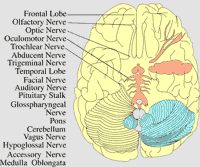Wednesday, May 23, 2007
Take Me to Your Lead Generation Optimization Leader!
 In case you missed the news, the top priority for marketers in 2007 is to quantify the value of marketing programs and investments, according to the CMO Council's Marketing Outlook 2007 survey. 44% of respondents said this was their primary goal in 2007, a change from 2006 where the emphasis was on building sales.
In case you missed the news, the top priority for marketers in 2007 is to quantify the value of marketing programs and investments, according to the CMO Council's Marketing Outlook 2007 survey. 44% of respondents said this was their primary goal in 2007, a change from 2006 where the emphasis was on building sales.
I agree that it is critical to be able to quantify the value of marketing investments and certainly that methodologies need to be put in place to do that, but is it possible that the pendulum has shifted too far in the opposite direction? After all, without lead generation and sales you won't be around long to enough to worry about quantifying the value of your investments.
Perhaps the point is that seeking to quantify marketing ROI, if done well, gives senior leadership and the marketing team the decision-making tools to adjust initiatives in mid-stream — potentially saving a troubled program and driving even better performance from programs that are already doing well. It ensures that all marketing programs are lead generators and (ultimately) sale closers. And there is evidence of other compelling reasons to optimize the lead generation process with marketing ROI measurement: in companies that are "lead generation optimization leaders" — companies characterized by the tight integration of sales and marketing groups in which high-quality leads are delivered to the sales force and higher conversion rates of leads to first calls — there are higher win rates, more sales people making quotas and faster ramp-up for new sales people than in other companies
What's the bad news? Most companies do not fall into this group. In fact, one report found that only about 8% of companies are defined as "Lead Generation Optimization (LGO) Leaders." I guess we all need something to shoot for!
Sources:
Levey, Richard H. "Walking the Walk: Measurement tops marketer's to-do lists" Direct Magazine. May 2007. pg 15.
“Optimizing Lead Generation: What’s the payback?” CSO Insights (via BtoB Magazine). July 10 2006 p1
Technorati Tags: b2b, demand creation, lead generation optimization, leads, marketing
Friday, May 04, 2007
Dissecting Marketing Forensics
 I just came across an intriguing banner ad offer for a webinar titled "Multichannel Forensics: Understanding How Customers Interact with Advertising, Products, Brands and Channels" being given by Kevin Hillstrom and it made me think - what exactly is multichannel or marketing forensics? The marketer in me likes the phrase - it has a very scientific ring to it - and perhaps some clients might even think it sounds good when they pitch to their bosses for budget money for a "multichannel forensics initiative." After registering for the webinar (yes, I signed up to see what it's all about), I decided to do a little research into how this term is being bandied around the Web.
I just came across an intriguing banner ad offer for a webinar titled "Multichannel Forensics: Understanding How Customers Interact with Advertising, Products, Brands and Channels" being given by Kevin Hillstrom and it made me think - what exactly is multichannel or marketing forensics? The marketer in me likes the phrase - it has a very scientific ring to it - and perhaps some clients might even think it sounds good when they pitch to their bosses for budget money for a "multichannel forensics initiative." After registering for the webinar (yes, I signed up to see what it's all about), I decided to do a little research into how this term is being bandied around the Web.
As far as search engines go, Google had 933 hits for the quoted term "multichannel forensics" and most seemed related to marketing data mining. The use of "marketing forensics" was somewhat less common with only 170 hits and one of them for a company of that name doing marketing-ish things to increase product sales. In the blogosphere, Technorati lists 27 posts mentioning "multichannel forensics," and only one relevant post for "marketing forensics" (as of this writing), so the coinage of these phrases is probably relatively new and/or obscure. In most instances it seems the terms are used merely as a sexier alternative to customer intelligence.
But what should "marketing forensics" mean, especially if we hope clients have a more understanding response to its use than a quizzical 'huh?'
Paraphrasing somewhat from Kevin Hillstrom's whitepaper "An Introduction to Multichannel Forensics" a place to start might be:
Multichannel Forensics are the methods, made up of a series of analyses, that are applied to a multichannel environment to help us understand the complex behavior of how customers interact with products, services, brands, and channels.
That seems pretty much in line with how The American Heritage Dictionary defines forensics:
- The art or study of formal debate; argumentation.
- The use of science and technology to investigate and establish facts in criminal or civil courts of law.
The use of "science and technology" to uncover customer insight is key - the importance of having a method and means to measure how customers interact with your business cannot be overstated. The next trick is maintaining and integrating these processes across multiple channels so that a comprehensive picture of the customer can be captured. And don't forget about the "argumentation" part: there needs to be plenty of upfront discussion and agreement about what needs to be measured as well as what those measurements are. Everyone defines success differently.
Technorati Tags: b2b, demand creation, leads, marketing, marketing forensics, multichannel


